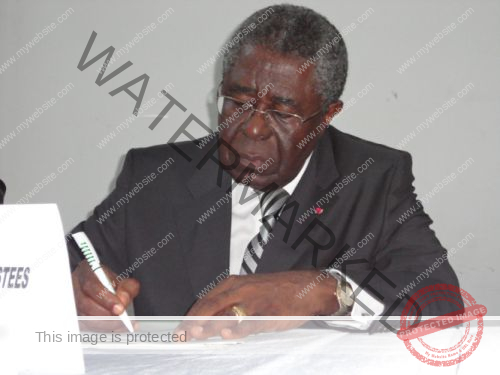Peter Mafany Musonge reducing a peoples identity to bilingualism
By Barnabas Timti
For decades, the debate in international and local circles has often been couched in misleading terms: “the Anglophone problem.” But let us be clear—what we face today is not simply a linguistic or cultural imbalance within the Republic of Cameroon. What we confront is a systematic, state-sponsored effort to erase an entire national identity—the identity of the people of the former British Southern Cameroons. This is not an Anglophone problem. This is the Ambazonia problem.
The Ethnic Engineering of a Phantom Eleventh Province
The regime of Paul Biya has spent over four decades perfecting a system of ethnic engineering, designed to dissolve the distinct political and historical identity of Ambazonia into what is now cynically labeled the “Eleventh Province.” Through the abolition of the federal system, the militarization of governance, and the deliberate distortion of recruitment policies in public service, the Biya regime succeeded in building what we might now call a colonial façade—a structure that retains the outward appearance of unity while methodically crushing the foundations of Ambazonian selfhood.
Nowhere is this erasure more evident than in the state-run broadcast media. When one examines the profiles of the regime’s most prominent “Anglophone” faces—Peter Essoka, Eric Chinje, Patrick Sianne, Wete Francis, Zachary Nkuo, Njomo Kevin, Endale Lotin—a pattern becomes painfully obvious. Many of these individuals either have ancestral connections to La République du Cameroun or were carefully promoted as proxies to weaken genuine Ambazonian representation. They became ambassadors of a false narrative, reinforcing the illusion of inclusion while helping to marginalize the very people whose cause they were presumed to carry.
The Doctrine Behind the Deception: Communal Liberalism and the Essingan Cult
This systematic erasure did not arise spontaneously. It was ideologically framed under what Paul Biya labeled “Communal Liberalism”—a vague, autocratic doctrine that promised social harmony while entrenching centralized authoritarianism. Introduced in the late 1980s, this doctrine was neither communal nor liberal. Instead, it was a Cameroonianized adaptation of France’s neocolonial philosophy, crafted by French operatives and passed through African proxies to further French geopolitical interests in Africa.
At the center of this ideological architecture is the Essingan cult—a secretive ethnic and political fraternity that exerts deep influence in Yaoundé’s inner circles. The cult’s belief in a 1,000-year rule of the Beti-Fang elite, eerily reminiscent of Hitler’s Nazi vision of the Third Reich, exposes the dangerous supremacist undertones behind Biya’s long reign. Like Hitler, Biya has surrounded himself with ideologues who believe in the permanence of their rule—through cultural assimilation, ethnic dominance, and historical revisionism.
It is through Communal Liberalism and Essingan ideology that Ambazonia was erased from national consciousness, replaced by a manufactured Eleventh Province, whose function is to legitimize central rule while keeping Ambazonians politically voiceless, economically dependent, and culturally disoriented.
Recycled Proxyism in the Resistance
Worse still, this same pattern has begun to repeat itself within the Ambazonian revolution—particularly in diaspora activism. A number of individuals who were initially celebrated as revolutionary voices have revealed troubling alignments—both in ideology and in ancestry. Several of the most vocal opponents of President Dr. Samuel Ikome Sako within the diaspora have deep ancestral roots not in Ambazonia, but in Bassaland and the Bamileke kingdoms of La République du Cameroun.
Among them are Cho Ayaba, Paul Nilling, Joe Carr, and Millan Atam—names that frequently surface in disruptive attempts to fragment or delegitimize the Transitional Authority led by Dr. Sako. While ethnic origin alone should never be a basis for exclusion, the pattern reflects a calculated effort to dilute, distort, and derail an authentic Ambazonian nationalist agenda from within.
Their resistance to institutional order, electoral legitimacy, and constitutional continuity suggests a deeper agenda than ideological disagreement. It mirrors the same assimilationist strategy deployed by Yaoundé: inject, divide, control. These individuals have weaponized diaspora platforms to amplify confusion, create parallel structures, and discredit the only constitutionally backed government recognized by Ambazonians at home and abroad. In doing so, they serve as de facto proxy agents, consciously or unconsciously echoing the regime’s long-standing playbook—break Ambazonia from within.
Dr. Sako’s Vision: Reclaiming Authenticity, Restoring Dignity
In the face of this multi-layered betrayal, President Dr. Samuel Ikome Sako has articulated a vision that re-centers the struggle on authentic Ambazonian values, identity, and governance. His leadership is grounded in the following pillars:
Institutional Sovereignty – Building independent Ambazonian institutions based on the will of the people, not colonial legacies.
Merit and Integrity – Promoting leadership rooted in integrity, technical competence, and cultural rootedness—not ethnic tokenism.
Post-war Reconstruction – Creating a master plan for resettlement, infrastructure renewal, and economic revitalization led by Ambazonian experts.
Civic Reorientation – Educating a new generation of Ambazonians to understand their history, protect their identity, and take pride in their national heritage.
Global Alliances with Principles – Engaging with the international community not on the basis of begging, but on justice, truth, and legal standing under international law.
As Dr. Sako aptly puts it:
“Liberation is not a slogan; it is a system of truth, justice, and sacrifice. Our people deserve more than rhetoric—they deserve a future built on authenticity, not borrowed lies.”
A Nation in Recovery, Not Disarray
The Ambazonian problem is not an accidental byproduct of poor governance—it is the deliberate outcome of a Françafrique strategy to erase a people, distort a history, and hijack a future.
But the solution lies in truth, discipline, and vision. It lies in recognizing that the so-called Anglophone elites paraded before us are not Ambazonia’s voice. And that freedom will not come from the regime’s handpicked messengers, nor from revolutionaries whose roots remain intertwined with the oppressor.
Freedom will come from those who are willing to confront uncomfortable truths and build a new Ambazonia on the ashes of deception. That is the work before us. And it has already begun.
Barnabas Timti

